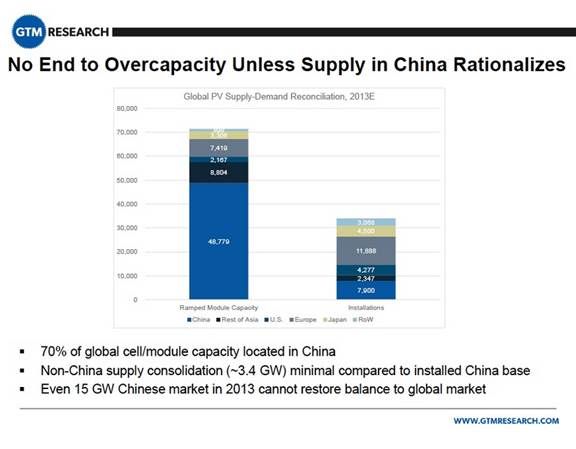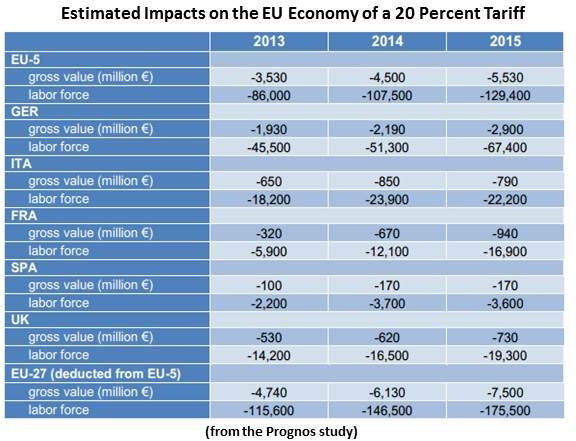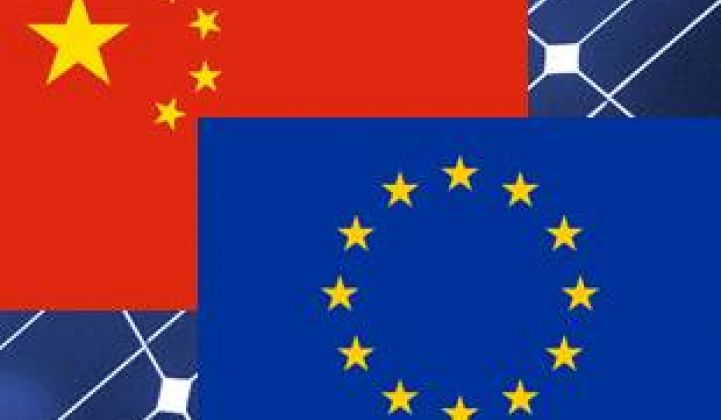Europe will impose tariffs on imported Chinese solar modules, probably by June 6.
Last-minute talks between Chinese and European Commission (EC) officials failed to head off imposition of the tariffs, according to the Wall Street Journal.
The tariffs will average 47.6 percent and will affect 100-plus Chinese manufacturers found by an EC investigation to have been involved in dumping solar products at market-breaking low prices in the European Union (EU), as reported May 9 by GTM.
Suntech Power Holdings (STP) and subsidiaries will be charged tariffs of 48.6 percent; LDK Solar (LDK) will pay 55.9 percent; Trina Solar (TSL) will pay 51.5 percent; and JinkoSolar (JKS) will pay tariffs of 58.7 percent. Companies that did not cooperate with the investigation will pay a tariff of 67.9 percent.
EU imports of crystalline silicon photovoltaic (PV) panels, cells, and wafers were valued at $27.6 billion in 2011, which was more than half the global PV market, according to Bloomberg. The Chinese companies, Bloomberg added, owned almost no global PV market share in 2004 and 80 percent of it by 2011.
Solar products were more than 7 percent of China's total exports to the EU in 2011, the WSJ reported.
As Chinese and EU officials met for critical late-stage negotiations, German Chancellor Angela Merkel threw the weight of Germany’s powerful solar market behind stopping the tariffs. She promised Germany would make certain such talks were productive.
China is expected to retaliate with tariffs on European polysilicon used for solar module manufacturing after the EU finalizes the tariffs, Forbes reported. That could hurt Germany’s Wacker Chemie AG, one of the world's biggest polysilicon producers.
The decision “will not only harm jobs in China,” Chinese Premier Li Keqiang said at a joint press conference. “It will also affect development and endanger industry in Europe,” Bloomberg reported.
The low-priced solar products are directly related to manufacturing oversupply in China, according to GTM Research Senior Analyst Shyam Mehta.

China’s solar manufacturers offered to increase prices and limit exports to avoid tariffs but the offer was rejected by EC officials who suspected China’s government would take a harder line, according to WSJ.
This action is like the EU dropping a boulder on its own foot, Ministry of Commerce spokesman Shen Danyang was quoted as saying by Australia’s The Age.
Merkel promised Germany would work to prevent “permanent tariffs,” according to Forbes. This suggested the June 6 EC decision, which will be in effect for six months, may not be supported by a final EU member nation vote. “In general, the southern countries within the EU tend to vote in favor of trade protectionism, while the U.K. and Nordic countries tend to vote against,” Forbes added.
There is also a World Trade Organization complaint on the same issue to be settled later this summer, and a separate countervailing duties issue to be decided by the EC in December that would impose tariffs for five years.
Germany’s SolarWorld, the dominant EU panel manufacturer, called for the anti-dumping investigation in the wake of price drops of 75 percent in module prices, 42 percent in cells, and 40 percent in wafers between 2009 and 2012, the WSJ reported.
The competition left the once-dominant SolarWorld with “$1.2 billion in liabilities,” according to Reuters.
U.S. authorities finalized comparable AD and countervailing duty (CVD) tariffs in October 2012. Suntech’s rate is 35.97 percent, Trina’s is 23.75 percent, others must pay a 30.66 percent tariff and those caught in violation will have a 254.66 percent rate imposed. SolarWorld was part of the coalition of U.S. and EU solar panel manufacturing companies that called for U.S. tariffs.
Because the low prices have driven an unprecedented expansion in solar, distributors and installers oppose the tariffs. The EU-based Association for Affordable Solar Energy (AFASE) continues to lead an effort to block them. AFASE cited a study by Prognos, a German research consultancy, that found tariffs will compromise Europe’s economy.

A tariff of 20 percent, Prognos found, would put roughly 107,600 jobs at risk in the top five EU economies (EU-5) from 2013 to 2015, including 54,700 jobs in Germany. It would cost the EU-5 €13.6 billion, including a German loss of €7 billion. With tariffs of 35 percent or 60 percent, “these numbers are significantly higher.”
SolarWorld has acknowledged the tariffs have not protected U.S. solar manufacturers, SunEdison founder/Coalition for Affordable Solar Energy (CASE) President Jigar Shah recently wrote in GTM. Instead, they have initiated an international trade war.
“The big winners will be the producers of coal, oil and natural gas, not solar manufacturers in the U.S., China, the EU or anywhere else,” Shah wrote. “We need to work together to create an international framework for a worldwide solar industry.”
Although the solar tariff decision would be the EU’s biggest ever, there are 31 ongoing trade investigations, according to The Age. Eighteen involve China. With the failure of the recent talks, another investigation, this one into dumping of Chinese telecommunications equipment, is expected to move ahead.



